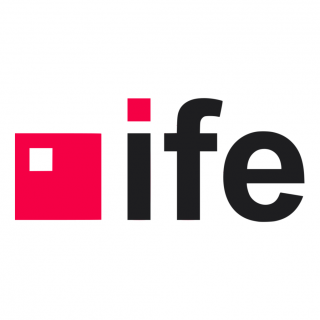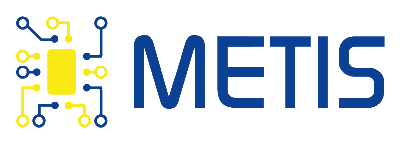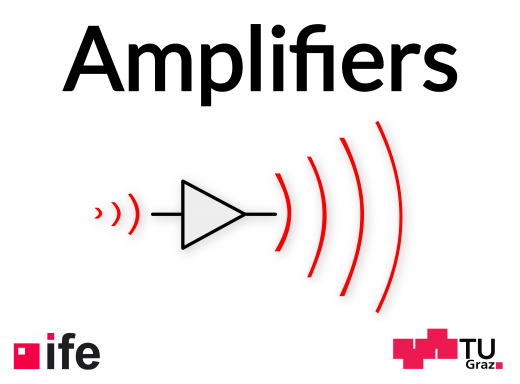ElectrONiX - Amplifiers
Kursstart: 22. Februar 2022
ElectrONiX - Amplifiers
Institut für Elektronik
Dieser Kurs ist Teil einer MOOC-Serie: ElectrONiX
Wissenschaftliche Einordnung:
Kursstart: 22. Februar 2022
ElectrONiX - Amplifiers
Institut für Elektronik
Dieser Kurs ist Teil einer MOOC-Serie: ElectrONiX
-
Umfang: 7 Lektionen
-
Aufwand: 4 Stunden/Woche
-
Teilnehmende aktuell: 896
-
Lizenz: CC BY 4.0
-
Kursstart: 22. Februar 2022
-
Kursende: -
-
Status aktuell: Laufender Kurs
-
Verfügbare Sprachen:
Trailer
Details zum Kurs
Inhaltsübersicht
Allgemeine Informationen zum Kurs
Elektronik ist die Wissenschaft der Steuerung elektrischen Stromes. Die wohl wichtigsten Steuerelemente, die uns in der Mikroelektronik zur Verfügung stehen sind Transistoren und Dioden. Sie dienen als regelbare Ventile mit denen sich komplexe Verstärkerschaltungen aufbauen lassen.
Doch wie funktionieren solche Verstärker? Wie lassen sie sich berechnen und dimensionieren und welche Eigenschaften haben solche Schaltungen?
Kursinhalt
In diesem MOOC werden die grundlegenden Eigenschaften von Dioden und unterschiedlichen Transistortypen, sowie deren Einsatz in verschiedenen Verstärkerschaltungen behandelt. Ziel dabei ist es sowohl das mathematische Werkzeug, als auch das praktische Verständnis zu vermitteln um Verstärkerschaltungen selbstständig dimensionieren zu können. Dazu stehen viele Rechen-, Simulations- und Praxisbeipsiele zur Verfügung um am Ende des Kurses einen einfachen Audioverstärker aufbauen zu können, sowie umfassende Kenntnisse über Funktion und Einsatz von Operationsverstärkern zu erlangen.
Der Kurs gliedert sich in fünf Teile:
- Grundlegende Komponenten
- Dioden
- Bipolartransistoren
- MOSFETs
- Stromquellen
- Transistorverstärker
- Differenzverstärker
- Operationsverstärker
Lernziele
Die Lernziele der einzelnen Abschnitte sind in vier Lernzieltaxonomiestufen gegliedert und in den jeweiligen Abschnitten noch einmal genau ausgeführt. Der Übersichtlichkeit halber sind hier nur die Lernziele der höchsten Taxonomiestufe angeführt.
- Eine geeignete Diode für eine gegebene Anwendung wählen und passende Vorwiderstände berechnen.
- Geeignete Bauteile für gegebene Schaltungen mit MOSFETs und Bipolartransistoren wählen, berechnen und aufbauen.
- Geeignete Bauteile für eine gegebene Schaltung einer Stromquelle, eines Stromspiegels und einer Referenzspannungsquelle wählen.
- Einen Spannungsverstärker aus einem Stromverstärker entwickeln.
- Einen Differenzverstärker anhand vorgegebener Parameter entwerfen.
- Geeignete Transistoren für das Design eines Differenzverstärkers anhand vorgegebener Parameter mit Hilfe deren Datenblättern wählen.
- Eine Operationsverstärkerschaltung für eine gegebene Eingangs- und Ausgangsspannung wählen und dimensionieren.
- Eine Möglichkeit zum Abgleich der Offsetspannung in einer gegebenen Operationsverstärkerschaltung entwickeln.
- Anhand eines Eingangs- und Ausgangssignals die Ursache für nicht-ideales Verhalten einer Operationsverstärkerschaltung identifizieren.
Vorkenntnisse
Der MOOC setzt nur ein paar grundlegende Kenntnisse der Elektrotechnik voraus. Zu diesen gehören:
- Ohmsches Gesetz,
- Kirchhoffsche Regeln,
- Wechsel- und Gleichstrom,
- Grundlagen elektrischer Bauelemente (Widerstand, Spule, Kondensator, Spannungs- und Stromquellen).
Kursablauf
Jede Einheit ist folgendermaßen aufgebaut:
- In den ersten Videos werden die theoretischen Grundlagen jeder Einheit geschaffen.
- Danach folgt eine freiwillige Selbstüberprüfung, mit der das gerade erworbene theoretische Wissen überprüft werden kann.
- Im darauffolgenden Block werden praktische Beispiele behandelt,
- wieder gefolgt von einer freiwilligen Selbstüberprüfung.
- Für besonders Motivierte gibt es dann noch zusätzliches Material. Das können Simulationsbeispiele oder detaillierte Ausarbeitungen sein.
- Zuletzt folgt eine Lernzielkontrolle. Um ein Zertifikat zu erhalten müssen hierbei mindestens 75% der Punkte erreicht werden.
- Bei positiver Absolvierung der Lernzielkontrolle gibt es einen Badge/ein Abzeichen.
Fragen können im begleitenden Forum gestellt werden. Diese können dann sowohl die Kursersteller als auch die Teilnehnmer beantworten.
Zertifikat
Für die aktive Teilnahme am Kurs erfolgt bei Abschluss die Ausstellung eines automatisierten Zertifikats, welches Ihren Benutzernamen, den Kursnamen und die abgeschlossenen Lektionen beinhalten. Es wird darauf hingewiesen, dass es sich nur um eine Bestätigung handelt, die aussagt, dass der Benutzer zumindest 75% der gestellten Selbstüberprüfungsfragen richtig beantwortet hat.
Zusätzlich wird zu jeder Einheit ein Badge erstellt, der als Bild heruntergeladen werden kann.
Lizenz
Dieses Werk ist lizenziert unter einer Creative Commons - 4.0 International (CC BY 4.0). Dies inkludiert alle Abbildungen mit Ausnahme aller Logos.
Zusätzliche Inhalte
Lehrveranstaltungen
Dieser Kurs kann begleitend zur Lehrveranstaltung "Elektronische Schaltungstechnik 1, VO" an der Technischen Universität Graz absolviert werden.
Kursleitung

Institut für Elektronik
Projektleitung:
Michael Fuchs
ElectrONiX MOOC Team:
Dominik Zupan, Patrick Schrey, Nikolaus Czepl
Sabrina Koffler, Clara Scheiber, Thomas Schwar, Christoph Maier
Videoschnitt- und Ton:
Jeremias Hutegger, Daniel Brantner (LLT TU Graz), Stefan Janisch (LLT TU Graz)
Übersetzung:
Ćazim Sinanagić
Partner:innen
Dieser MOOC wurde mit Hilfe des METIS ("MicroElectronics, Training, Industry and Skills") Projektes im Rahmen des Erasmus+ Programms der Europäischen Union finanziert. Nähere Informationen zum Projekt gibt es unter https://www.metis4skills.eu/.
-

Technische Universität Graz
-

METIS
-

Gefördert von Erasmus+

